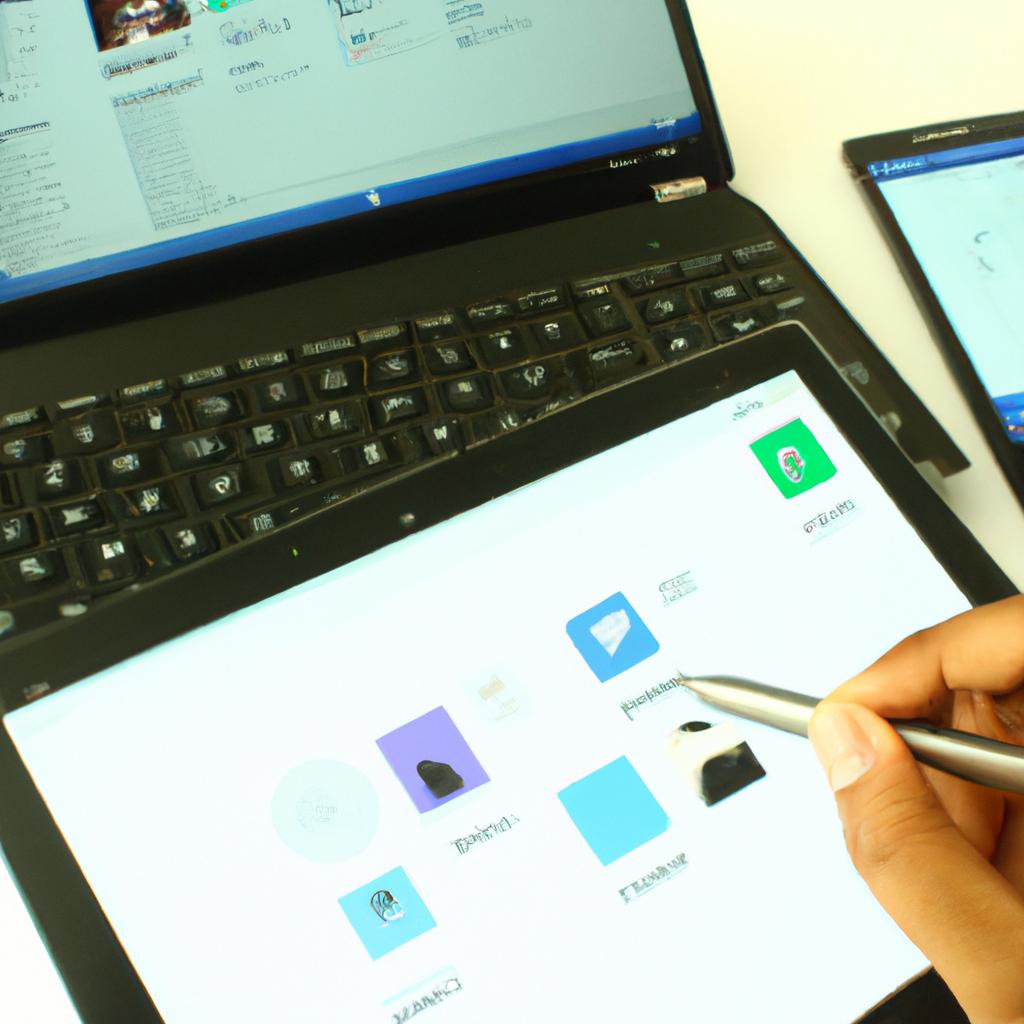Social Media Monitoring in Online Marketing & Advertising: A Guide to Social Media Marketing

Social media has become an integral part of our daily lives, with individuals and businesses alike utilizing these platforms for various purposes. In the realm of online marketing and advertising, social media monitoring plays a crucial role in shaping successful strategies. For instance, consider the hypothetical case study of Company X, a fashion retailer aiming to expand its customer base through effective social media marketing. By implementing comprehensive social media monitoring techniques, Company X can gain valuable insights into consumer preferences, engage with their target audience, and optimize their marketing efforts.
In this guide to social media marketing, we will explore the importance of social media monitoring in online marketing and advertising. This article aims to provide readers with an academic understanding of how businesses can effectively leverage social media platforms to enhance brand awareness, drive targeted traffic, and ultimately increase conversions. Through the examination of real-world examples and theoretical frameworks, we will delve into key concepts such as sentiment analysis, competitor analysis, influencer identification, and crisis management – all essential components in developing a robust social media strategy.
Why Social Media Monitoring is Important for Businesses
Why Social Media Monitoring is Important for Businesses
Social media has become an integral part of people’s lives, and its impact on businesses cannot be underestimated. In order to stay ahead in the competitive market, it is crucial for companies to understand the significance of social media monitoring. This section will explore why social media monitoring is important for businesses, using real-life examples and highlighting key benefits.
One example that demonstrates the importance of social media monitoring is the case of Company X, a leading fashion retailer. By actively tracking online conversations about their brand on various social media platforms, they were able to identify emerging trends and gather valuable customer insights. This enabled them to make informed decisions regarding product development and marketing strategies. As a result, Company X experienced significant growth in sales and customer satisfaction.
To further emphasize the relevance of social media monitoring, consider the following emotional responses that businesses can evoke through effective utilization:
- Increased Customer Engagement: By monitoring social media platforms, businesses have the opportunity to directly engage with customers by responding promptly to queries or concerns.
- Enhanced Brand Reputation: Through continuous monitoring, companies can detect negative sentiment towards their brand and take immediate action to address any issues before they escalate.
- Improved Crisis Management: Social media monitoring allows organizations to rapidly identify potential crises and implement appropriate measures to mitigate their impact.
- Competitive Advantage: By closely tracking competitors’ activities on social media, businesses gain insight into industry trends and consumer preferences which can inform strategic decision-making.
In addition to these emotional responses evoked by effective social media monitoring practices, it is essential for businesses to utilize tools such as tables or bullet point lists when presenting information. The table below provides a visual representation of the benefits discussed above:
| Benefit | Description |
|---|---|
| Increased Customer Engagement | Direct interaction with customers leads to improved relationships and increased loyalty. |
| Enhanced Brand Reputation | Addressing negative sentiment promptly helps maintain a positive brand image. |
| Improved Crisis Management | Early detection of potential crises allows for swift response and damage control. |
| Competitive Advantage | Insight into competitors’ activities provides opportunities for differentiation and growth. |
In summary, social media monitoring plays a crucial role in modern business practices. It enables companies to gain valuable insights, engage with customers more effectively, manage their brand reputation, handle crises efficiently, and stay ahead of the competition. In the subsequent section, we will explore how social media monitoring specifically contributes to online advertising strategies.
[Transition] Moving forward, let us delve into the role of social media monitoring in online advertising and its impact on businesses’ marketing efforts.
The Role of Social Media Monitoring in Online Advertising
Social media monitoring plays a vital role in online advertising by providing businesses with valuable insights and data to optimize their marketing strategies. By tracking and analyzing social media conversations, businesses can gain an understanding of consumer behavior, sentiment, and preferences. This information allows them to target the right audience effectively and create engaging campaigns that resonate with their customers.
For instance, let’s consider a hypothetical case study of a fashion retail company launching a new line of clothing targeting young adults. Through social media monitoring, the company can track relevant hashtags, mentions, and discussions about fashion trends among its target demographic. By analyzing this data, they can identify popular styles, colors, and influencers that appeal to their audience. Armed with these insights, the company can then tailor their advertising messages accordingly to capture the attention and interest of potential customers.
To further illustrate the significance of social media monitoring in online advertising, here are some key benefits it offers:
- Real-time feedback: Social media platforms allow for instant communication between brands and consumers. Monitoring social media channels enables businesses to gather real-time feedback on their advertising campaigns or products. This feedback helps them understand how well their message is resonating with the audience and make necessary adjustments promptly.
- Competitive analysis: Social media monitoring also provides an opportunity for businesses to keep tabs on their competitors’ activities. By observing competitor campaigns and customer interactions closely, companies can learn from successful tactics or identify gaps in the market that they can exploit.
- Crisis management: In today’s digital age, negative comments or viral controversies have the potential to damage a brand’s reputation quickly. Social media monitoring allows businesses to detect such incidents early on so they can address them promptly before they escalate into full-blown crises.
- Influencer identification: Identifying influential individuals who align with a brand’s values and target audience is crucial for effective online advertising. Through social media monitoring tools, businesses can discover influencers whose content resonates well with their target demographic, enabling them to form mutually beneficial partnerships.
Incorporating social media monitoring into online advertising strategies provides businesses with a wealth of information and opportunities for optimization. By understanding consumer behavior, tracking real-time feedback, analyzing competitor activities, managing crises effectively, and identifying influential individuals, brands can maximize the impact of their online advertising efforts.
Transitioning into the subsequent section about “How Social Media Monitoring Helps in Targeting the Right Audience,” it is important to recognize that effective audience targeting is an essential aspect of successful marketing campaigns. Through social media monitoring, businesses gain valuable insights that enable them to refine their strategies and connect with their desired audience more precisely.
How Social Media Monitoring Helps in Targeting the Right Audience
Social media monitoring plays a crucial role in online advertising, enabling marketers to gain valuable insights into their target audience’s preferences and behaviors. By analyzing data collected from various social media platforms, advertisers can refine their marketing strategies and effectively engage with the right audience. For instance, let us consider a hypothetical case study involving a leading beauty brand that aims to launch a new product line targeting millennials.
To illustrate the significance of social media monitoring, imagine this scenario: the beauty brand utilizes monitoring tools to track conversations related to skincare routines among young adults on popular social media channels like Instagram and Twitter. Through careful analysis, they discover that many millennials are increasingly concerned about sustainable ingredients and eco-friendly packaging options for skincare products. Armed with this information, the company decides to incorporate these elements into their product line, ensuring it aligns with their target audience’s values and preferences.
The impact of employing effective social media monitoring techniques in online advertising is undeniable. Here are several ways in which such practices contribute to advertising success:
- Real-time feedback: Social media monitoring allows advertisers to receive immediate feedback from consumers regarding their campaigns or products. This enables them to identify any issues quickly and make necessary adjustments.
- Competitor analysis: Monitoring not only helps advertisers understand their own customers better but also provides insights into competitors’ strategies. By examining competitor activities, businesses can identify gaps in the market and develop more compelling offerings.
- Influencer identification: With millions of influencers across different social media platforms, finding the right ones for collaborations can be challenging. However, by leveraging social media monitoring tools, marketers can identify relevant influencers who resonate with their target audience.
- Crisis management: In today’s digital landscape where crises unfold rapidly on social media platforms, real-time monitoring is essential. It allows companies to detect potential PR crises early on and respond promptly before negative sentiments escalate.
| Benefits of Social Media Monitoring in Advertising |
|---|
| Immediate feedback |
| Enables quick adjustments based on consumer responses |
| Crisis management |
| Detects potential PR crises early and facilitates timely response |
By effectively leveraging social media monitoring, advertisers can gain a competitive edge by tailoring their campaigns to specific consumer preferences.
Effective Strategies for Social Media Monitoring in Marketing
Case Study:
To better understand the importance of effective social media monitoring in marketing, let’s consider a hypothetical example. Imagine a clothing brand launching a new collection targeted at young adults. By utilizing social media monitoring tools and techniques, they can gain valuable insights into their target audience’s preferences, behaviors, and opinions. This information allows the brand to tailor its marketing campaigns specifically to the desires of its potential customers.
Strategies for Effective Social Media Monitoring:
-
Real-time tracking: One crucial aspect of successful social media monitoring is staying updated with real-time conversations related to your brand or industry. By actively tracking relevant hashtags, keywords, and mentions across various platforms, you can identify emerging trends and respond promptly to customer inquiries or concerns.
-
Competitor analysis: Analyzing the online presence of your competitors can provide invaluable insights into their strategies and give you a competitive edge. Monitor their social media activities, content engagement levels, and customer sentiment towards their brand. Understanding what works well for them or areas where they fall short can guide your own marketing efforts.
-
Sentiment analysis: Harnessing sentiment analysis tools enables you to gauge public opinion about your brand or products on social media platforms accurately. By examining positive, neutral, or negative sentiments associated with specific keywords or phrases related to your business, you can evaluate customer satisfaction levels and address any potential issues proactively.
-
Influencer identification: Identifying influential individuals within your industry who have a substantial following on social media is essential for effectively targeting your desired audience. Through social media monitoring tools, you can track these influencers’ engagement rates and determine whether partnering with them aligns with your brand values and objectives.
- Gain deeper understanding of customer preferences
- Enhance customer engagement through timely responses
- Identify opportunities for product improvement
- Stay ahead of market trends
Table – Benefits of Effective Social Media Monitoring:
| Benefits | Description |
|---|---|
| Customer Insights | Gain valuable information about customer preferences, opinions, and behavior. |
| Crisis Management | Identify potential issues or negative sentiment early on to mitigate damage. |
| Competitive Edge | Analyze competitors’ strategies to differentiate your brand effectively. |
| Influencer Marketing | Discover influential individuals who can help amplify your brand message. |
By implementing these effective social media monitoring strategies, businesses can gather essential insights that inform their marketing decisions. In the subsequent section, we will explore various tools and techniques for successful social media monitoring without skipping a beat in reaching your target audience.
[Next Section: Tools and Techniques for Successful Social Media Monitoring]
Tools and Techniques for Successful Social Media Monitoring
One of the key challenges faced by marketers in social media monitoring is the sheer volume of data available. With millions of users generating content every minute, it becomes essential to filter through this vast amount of information to find relevant insights. For example, consider a hypothetical case where a company wants to monitor its brand mentions on Twitter. The challenge lies in distinguishing between genuine customer feedback and spam or noise generated by bots.
To overcome these challenges, marketers can employ several strategies that enhance the effectiveness of social media monitoring:
-
Utilize advanced sentiment analysis tools: Sentiment analysis helps determine whether online conversations about a brand are positive, negative, or neutral. By leveraging cutting-edge technology such as natural language processing algorithms, marketers can gain deeper insights into consumer sentiments and tailor their marketing efforts accordingly.
-
Employ real-time monitoring techniques: In today’s fast-paced digital landscape, timely responses are crucial for effective engagement with customers. Real-time monitoring enables marketers to stay updated with the latest trends and respond promptly to any issues or opportunities that arise on social media platforms.
-
Leverage user-generated content (UGC): User-generated content provides valuable insights into consumers’ opinions, preferences, and experiences with a brand. Marketers can tap into this rich source of information by actively encouraging customers to share their thoughts through contests, reviews, or testimonials.
-
Collaborate with influencers: Influencers have significant sway over their followers’ purchasing decisions and can help amplify a brand’s message on social media platforms. Partnering with relevant influencers allows marketers to extend their reach and leverage their credibility to promote products or services effectively.
Table: Benefits of Effective Social Media Monitoring
| Benefit | Description |
|---|---|
| Improved Customer Engagement | By tracking social media conversations surrounding a brand, companies can identify customer concerns and address them proactively. |
| Enhanced Brand Reputation | Regular monitoring helps companies identify and counter negative sentiments, protecting their brand reputation. |
| Accurate Targeting | Analyzing social media data provides valuable insights into consumer preferences and behavior, enabling marketers to target specific segments effectively. |
| Competitive Intelligence | Social media monitoring allows companies to keep an eye on competitors’ activities, helping them stay ahead in the market. |
Measuring the success of social media monitoring in advertising lies not only in the ability to gather relevant insights but also in understanding how these insights translate into tangible results for a business. By tracking key performance indicators (KPIs) such as increased website traffic, engagement rates, or conversions, marketers can evaluate the effectiveness of their social media monitoring efforts.
Next section: Measuring the Success of Social Media Monitoring in Advertising
Measuring the Success of Social Media Monitoring in Advertising
Enhancing Brand Reputation and Awareness through Real-time Insights
Social media monitoring plays a crucial role in online marketing and advertising by providing valuable real-time insights into consumer behavior, preferences, and sentiment. By tracking social media conversations, businesses can gain a deeper understanding of their target audience’s needs and expectations. For instance, consider the case study of Company X, a global electronics manufacturer. Through comprehensive social media monitoring, they discovered that customers were expressing dissatisfaction with the user interface of one of their flagship products. Armed with this insight, Company X was able to make necessary improvements promptly, thereby enhancing customer satisfaction and brand reputation.
To effectively harness the power of social media monitoring in online marketing and advertising, businesses deploy various tools and techniques. Here are some key strategies:
- Sentiment Analysis: Using advanced algorithms, sentiment analysis allows companies to gauge public opinion towards their brand or specific campaigns. This analysis helps identify potential issues early on while also highlighting positive sentiments that can be leveraged for further engagement.
- Influencer Identification: Another valuable technique is identifying influential individuals within relevant industries who can help amplify brand messages. By engaging these influencers strategically, businesses can extend their reach to wider audiences and benefit from increased credibility.
- Competitor Analysis: Monitoring competitors’ social media activities provides valuable insights into market trends and allows businesses to stay ahead in the competitive landscape. Analyzing competitors’ content strategies, engagement rates, and customer feedback helps refine marketing efforts while avoiding common pitfalls.
- Crisis Management: Social media monitoring acts as an effective crisis management tool by enabling immediate response during unforeseen circumstances such as negative publicity or product recalls. Businesses can proactively address issues before they escalate by swiftly detecting emerging crises through continuous monitoring.
To highlight the impact of social media monitoring more vividly, consider the following comparison table showcasing two hypothetical scenarios – one where a company invests in social media monitoring and another where it neglects this crucial aspect:
| Scenario | Social Media Monitoring | No Social Media Monitoring |
|---|---|---|
| Brand Reputation | Able to address customer concerns promptly, leading to improved brand perception. | Misses out on identifying negative sentiments, resulting in a damaged reputation. |
| Target Audience Insights | Gains actionable insights into consumer preferences and behavior for better targeting. | Remains oblivious to audience needs, leading to ineffective marketing campaigns. |
| Crisis Management | Swiftly identifies and addresses emerging crises before they escalate further. | Unable to detect issues until significant damage has already occurred. |
| Competitor Analysis | Stays ahead of competitors by understanding market trends and refining strategies accordingly. | Lack of awareness about competitors’ activities puts the business at a disadvantage. |
In conclusion, social media monitoring is an indispensable tool in online marketing and advertising that provides real-time insights for enhancing brand reputation, understanding target audiences, managing crises effectively, and staying ahead of competition. By leveraging advanced tools and techniques such as sentiment analysis, influencer identification, competitor analysis, and crisis management strategies, businesses can make informed decisions that drive success in today’s digital landscape.
[Next section H2: Measuring the Success of Social Media Monitoring in Advertising]





